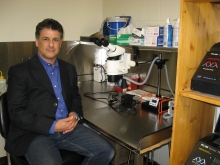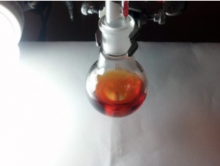The same brain-chemical system that mediates feelings of pleasure from sex, recreational drugs, and food is also critical to experiencing musical pleasure, according to a study by McGill University researchers published today in the Nature journal Scientific Reports.


The Natural Sciences and Engineering Research Council of Canada has awarded an E.W.R Steacie Memorial Fellowship to Prof. Tomislav Friščić, to support his work in an innovative branch of chemistry that aims to develop environmentally friendly alternatives to solvent-based chemical processes.
NSERC awards up to six of these two-year, $250,000 fellowships annually to enhance the career development of outstanding and highly promising scientists and engineers.

By Chris Chipello, McGill Newsroom
Could a cheap molecule used to disinfect swimming pools provide the key to creating a new form of DNA nanomaterials?


Imagine taking strands of DNA – the material in our cells that determines how we look and function – and using it to build tiny structures that can deliver drugs to targets within the body or take electronic miniaturization to a whole new level.

The research group of Prof. Tomislav Friščić in McGill’s Department of Chemistry has made a name for itself in the little-known, but growing field of “mechanochemistry,” in which chemical transformations are produced by milling, grinding or shearing solid-state ingredients – brute force, in other words, rather than fancy liquid agents. “Your coffee maker grinds things,” and grinding molecules in the lab involves much the same principle, Friščić notes. Using mechanical force also has the significant advantage of avoiding the use of environmentally harmful bulk solvents.

Researchers at McGill University have developed a new, low-cost method to build DNA nanotubes block by block – a breakthrough that could help pave the way for scaffolds made from DNA strands to be used in applications such as optical and electronic devices or smart drug-delivery systems.


Researchers at McGill University have succeeded in simultaneously observing the reorganizations of atomic positions and electron distribution during the transformation of the “smart material” vanadium dioxide (VO2) from a semiconductor into a metal – in a time frame a trillion times faster than the blink of an eye.

The new Chair was announced at McGill today by Senator Larry Smith, on behalf of the Honourable Ed Holder, Minister of State (Science and Technology).
This is McGill’s second CERC. The first, Dr. Luda Diatchenko, Canada Excellence Research Chair in Personalized Pain Medicine, was announced in September 2013. With this announcement, there are now 21 chairs in place at 15 universities across the country.

Dr. Robin Rogers, one of the world’s most renowned green chemists, will become Canada Excellence Research Chair (CERC) in Green Chemistry and Green Chemicals at McGill University. Rogers comes to Canada from The University of Alabama, where he was Robert Ramsay Chair of Chemistry and director of the Center for Green Manufacturing.


Dr. Harriet Hall, also known as the SkepDoc, reviews Dr. Joe Schwarcz' latest book, "The Right Chemistry," and concludes that both him and his book do it just right.
To read the review, please click here.

